Here's the full, historic speech made by US President Barack Obama at the University of Rangoon in Burma:
PRESIDENT OBAMA: Thank you. (Applause.) Myanmar Naingan, Mingalaba! (Laughter and applause.) I am very honored to be here at this university and to be the first President of the United States of America to visit your country.
I came here because of the importance of your country. You live at the crossroads of East and South Asia. You border the most populated nations on the planet. You have a history that reaches back thousands of years, and the ability to help determine the destiny of the fastest growing region of the world.
I came here because of the beauty and diversity of your country. I have seen just earlier today the golden stupa of Shwedagon, and have been moved by the timeless idea of metta - the belief that our time on this Earth can be defined by tolerance and by love.
And I know this land reaches from the crowded neighborhoods of this old city to the homes of more than 60,000 villages; from the peaks of the Himalayas, the forests of Karen State, to the banks of the Irrawady River.
I came here because of my respect for this university. It was here at this school where opposition to colonial rule first took hold. It was here that Aung San edited a magazine before leading an independence movement. It was here that U Thant learned the ways of the world before guiding it at the United Nations.
Here, scholarship thrived during the last century and students demanded their basic human rights. Now, your Parliament has at last passed a resolution to revitalise this university and it must reclaim its greatness, because the future of this country will be determined by the education of its youth.
I came here because of the history between our two countries. A century ago, American traders, merchants and missionaries came here to build bonds of faith and commerce and friendship. And from within these borders in World War II, our pilots flew into China and many of our troops gave their lives.
Both of our nations emerged from the British Empire, and the United States was among the first countries to recognise an independent Union of Burma. We were proud to found an American Center in Rangoon and to build exchanges with schools like this one. And through decades of differences, Americans have been united in their affection for this country and its people.
Above all, I came here because of America's belief in human dignity. Over the last several decades, our two countries became strangers. But today, I can tell you that we always remained hopeful about the people of this country, about you. You gave us hope and we bore witness to your courage.
We saw the activists dressed in white visit the families of political prisoners on Sundays and monks dressed in saffron protesting peacefully in the streets. We learned of ordinary people who organised relief teams to respond to a cyclone, and heard the voices of students and the beats of hip-hop artists projecting the sound of freedom.
We came to know exiles and refugees who never lost touch with their families or their ancestral home. And we were inspired by the fierce dignity of Daw Aung San Suu Kyi, as she proved that no human being can truly be imprisoned if hope burns in your heart.
When I took office as President, I sent a message to those governments who ruled by fear. I said, in my inauguration address, ''We will extend a hand if you are willing to unclench your fist.'' And over the last year and a half, a dramatic transition has begun, as a dictatorship of five decades has loosened its grip. Under President Thein Sein, the desire for change has been met by an agenda for reform.
A civilian now leads the government, and a parliament is asserting itself. The once-outlawed National League for Democracy stood in an election, and Aung San Suu Kyi is a Member of Parliament. Hundreds of prisoners of conscience have been released, and forced labor has been banned. Preliminary cease-fires have been reached with ethnic armies, and new laws allow for a more open economy.
So today, I've come to keep my promise and extend the hand of friendship. America now has an Ambassador in Rangoon, sanctions have been eased, and we will help rebuild an economy that can offer opportunity for its people, and serve as an engine of growth for the world.
But this remarkable journey has just begun, and has much further to go. Reforms launched from the top of society must meet the aspirations of citizens who form its foundation. The flickers of progress that we have seen must not be extinguished - they must be strengthened; they must become a shining North Star for all this nation's people.
And your success in that effort is important to the United States, as well as to me. Even though we come from different places, we share common dreams: to choose our leaders; to live together in peace; to get an education and make a good living; to love our families and our communities.
That's why freedom is not an abstract idea; freedom is the very thing that makes human progress possible - not just at the ballot box, but in our daily lives.
One of our greatest Presidents in the United States, Franklin Delano Roosevelt, understood this truth. He defined America's cause as more than the right to cast a ballot. He understood democracy was not just voting.
He called upon the world to embrace four fundamental freedoms: freedom of speech, freedom of worship, freedom from want, and freedom from fear. These four freedoms reinforce one another, and you cannot fully realise one without realising them all.
So that's the future that we seek for ourselves, and for all people. And that is what I want to speak to you about today.
First, we believe in the right of free expression so that the voices of ordinary people can be heard, and governments reflect their will - the people's will.
In the United States, for more than two centuries, we have worked to keep this promise for all of our citizens - to win freedom for those who were enslaved; to extend the right to vote for women and African Americans; to protect the rights of workers to organise.
And we recognise no two nations achieve these rights in exactly the same way, but there is no question that your country will be stronger if it draws on the strength of all of its people. That's what allows nations to succeed. That's what reform has begun to do.
Instead of being repressed, the right of people to assemble together must now be fully respected. Instead of being stifled, the veil of media censorship must continue to be lifted. And as you take these steps, you can draw on your progress.
Instead of being ignored, citizens who protested the construction of the Myitsone dam were heard. Instead of being outlawed, political parties have been allowed to participate. You can see progress being made.
As one voter said during the parliamentary elections here, ''Our parents and grandparents waited for this, but never saw it.'' And now you can see it. You can taste freedom.
And to protect the freedom of all the voters, those in power must accept constraints. That's what our American system is designed to do. Now, America may have the strongest military in the world, but it must submit to civilian control.
I, as the President of the United States, make determinations that the military then carries out, not the other way around. As President and Commander-In-Chief, I have that responsibility because I'm accountable to the people.
Now, on other hand, as President, I cannot just impose my will on Congress - the Congress of the United States - even though sometimes I wish I could. The legislative branch has its own powers and its own prerogatives, and so they check my power and balance my power.
I appoint some of our judges, but I cannot tell them how to rule, because every person in America - from a child living in poverty to me, the President of the United States - is equal under the law.
And a judge can make a determination as to whether or not I am upholding the law or breaking the law. And I am fully accountable to that law.
And I describe our system in the United States because that's how you must reach for the future that you deserve - a future where a single prisoner of conscience is one too many.
You need to reach for a future where the law is stronger than any single leader, because it's accountable to the people.
You need to reach for a future where no child is made to be a soldier and no woman is exploited, and where the laws protect them even if they're vulnerable, even if they're weak; a future where national security is strengthened by a military that serves under civilians and a Constitution that guarantees that only those who are elected by the people may govern.
On that journey, America will support you every step of the way - by using our assistance to empower civil society; by engaging your military to promote professionalism and human rights; and by partnering with you as you connect your progress towards democracy with economic development.
So advancing that journey will help you pursue a second freedom - the belief that all people should be free from want.
It's not enough to trade a prison of powerlessness for the pain of an empty stomach. But history shows that governments of the people and by the people and for the people are far more powerful in delivering prosperity. And that's the partnership we seek with you.
When ordinary people have a say in their own future, then your land can't just be taken away from you. And that's why reforms must ensure that the people of this nation can have that most fundamental of possessions - the right to own the title to the land on which you live and on which you work.
When your talents are unleashed, then opportunity will be created for all people. America is lifting our ban on companies doing business here, and your government has lifted restrictions on investment and taken steps to open up your economy.
And now, as more wealth flows into your borders, we hope and expect that it will lift up more people. It can't just help folks at the top. It has to help everybody. And that kind of economic growth, where everybody has opportunity - if you work hard, you can succeed - that's what gets a nation moving rapidly when it comes to develop.
But that kind of growth can only be created if corruption is left behind. For investment to lead to opportunity, reform must promote budgets that are transparent and industry that is privately owned.
To lead by example, America now insists that our companies meet high standards of openness and transparency if they're doing business here. And we'll work with organisations like the World Bank to support small businesses and to promote an economy that allows entrepreneurs, small businesspeople to thrive and allows workers to keep what they earn.
And I very much welcome your government's recent decision to join what we've called our Open Government Partnership, so that citizens can come to expect accountability and learn exactly how monies are spent and how your system of government operates.
Above all, when your voices are heard in government, it's far more likely that your basic needs will be met. And that's why reform must reach the daily lives of those who are hungry and those who are ill, and those who live without electricity or water. And here, too, America will do our part in working with you.
Today, I was proud to reestablish our USAID mission in this country, which is our lead development agency. And the United States wants to be a partner in helping this country, which used to be the rice bowl of Asia, to reestablish its capacity to feed its people and to care for its sick, and educate its children, and build its democratic institutions as you continue down the path of reform.
This country is famous for its natural resources, and they must be protected against exploitation. And let us remember that in a global economy, a country's greatest resource is its people.
So by investing in you, this nation can open the door for far more prosperity - because unlocking a nation's potential depends on empowering all its people, especially its young people.
Just as education is the key to America's future, it is going to the be the key to your future as well. And so we look forward to working with you, as we have with many of your neighbors, to extend that opportunity and to deepen exchanges among our students.
We want students from this country to travel to the United States and learn from us, and we want US students to come here and learn from you.
And this truth leads me to the third freedom that I want to discuss: the freedom to worship - the freedom to worship as you please, and your right to basic human dignity.
This country, like my own country, is blessed with diversity. Not everybody looks the same. Not everybody comes from the same region. Not everybody worships in the same way.
In your cities and towns, there are pagodas and temples, and mosques and churches standing side by side. Well over a hundred ethnic groups have been a part of your story. Yet within these borders, we've seen some of the world's longest running insurgencies, which have cost countless lives, and torn families and communities apart, and stood in the way of development.
No process of reform will succeed without national reconciliation. (Applause.) You now have a moment of remarkable opportunity to transform cease-fires into lasting settlements, and to pursue peace where conflicts still linger, including in Kachin State.
Those efforts must lead to a more just and lasting peace, including humanitarian access to those in need, and a chance for the displaced to return home.
Today, we look at the recent violence in Rakhine State that has caused so much suffering, and we see the danger of continued tensions there. For too long, the people of this state, including ethnic Rakhine, have faced crushing poverty and persecution.
But there is no excuse for violence against innocent people. And the Rohingya hold themselves - hold within themselves the same dignity as you do, and I do.
National reconciliation will take time, but for the sake of our common humanity, and for the sake of this country's future, it is necessary to stop incitement and to stop violence.
And I welcome the government's commitment to address the issues of injustice and accountability, and humanitarian access and citizenship. That's a vision that the world will support as you move forward.
Every nation struggles to define citizenship. America has had great debates about these issues, and those debates continue to this day, because we're a nation of immigrants - people coming from every different part of the world.
But what we've learned in the United States is that there are certain principles that are universal, apply to everybody no matter what you look like, no matter where you come from, no matter what religion you practice.
''The right of people to live without the threat that their families may be harmed or their homes may be burned simply because of who they are or where they come from.
''Only the people of this country ultimately can define your union, can define what it means to be a citizen of this country. But I have confidence that as you do that you can draw on this diversity as a strength and not a weakness.
''Your country will be stronger because of many different cultures, but you have to seize that opportunity. You have to recognise that strength.
I say this because my own country and my own life have taught me the power of diversity. The United States of America is a nation of Christians and Jews, and Muslims and Buddhists, and Hindus and non-believers.
Our story is shaped by every language; it's enriched by every culture. We have people from every corners of the world. We've tasted the bitterness of civil war and segregation, but our history shows us that hatred in the human heart can recede; that the lines between races and tribes fade away.
And what's left is a simple truth: e pluribus unum - that's what we say in America. Out of many, we are one nation and we are one people. And that truth has, time and again, made our union stronger. It has made our country stronger. It's part of what has made America great.
We amended our Constitution to extend the democratic principles that we hold dear. And I stand before you today as President of the most powerful nation on Earth, but recognising that once the color of my skin would have denied me the right to vote.
And so that should give you some sense that if our country can transcend its differences, then yours can, too. Every human being within these borders is a part of your nation's story, and you should embrace that.
That's not a source of weakness, that's a source of strength - if you recognise it.
And that brings me to the final freedom that I will discuss today, and that is the right of all people to live free from fear.
In many ways, fear is the force that stands between human beings and their dreams. Fear of conflict and the weapons of war. Fear of a future that is different from the past.
Fear of changes that are reordering our societies and economy. Fear of people who look different, or come from a different place, or worship in a different way.
In some of her darkest moments, when Aung San Suu Kyi was imprisoned, she wrote an essay about freedom from fear. She said fear of losing corrupts those who wield it - ''Fear of losing power corrupts those who wield it, and fear of the scourge of power corrupts those who are subject to it.''
That's the fear that you can leave behind. We see that chance in leaders who are beginning to understand that power comes from appealing to people's hopes, not people's fears. We see it in citizens who insist that this time must be different, that this time change will come and will continue.
As Aung San Suu Kyi wrote: ''Fear is not the natural state of civilized man.'' I believe that. And today, you are showing the world that fear does not have to be the natural state of life in this country.
That's why I am here. That's why I came to Rangoon. And that's why what happens here is so important - not only to this region, but to the world.
Because you're taking a journey that has the potential to inspire so many people. This is a test of whether a country can transition to a better place.
The United States of America is a Pacific nation, and we see our future as bound to those nations and peoples to our West. And as our economy recovers, this is where we believe we will find enormous growth.
As we have ended the wars that have dominated our foreign policy for a decade, this region will be a focus for our efforts to build a prosperous peace.
Here in Southeast Asia, we see the potential for integration among nations and people. And as President, I have embraced Asean for reasons that go beyond the fact that I spent some of my childhood in this region, in Indonesia.
Because with Asean, we see nations that are on the move - nations that are growing, and democracies that are emerging; governments that are cooperating; progress that's building on the diversity that spans oceans and islands and jungles and cities, peoples of every race and every religion.
This is what the 21st century should look like if we have the courage to put aside our differences and move forward with a sense of mutual interest and mutual respect.
And here in Rangoon, I want to send a message across Asia: We don't need to be defined by the prisons of the past. We need to look forward to the future. To the leadership of North Korea, I have offered a choice: let go of your nuclear weapons and choose the path of peace and progress. If you do, you will find an extended hand from the United States of America.
In 2012, we don't need to cling to the divisions of East, West and North and South. We welcome the peaceful rise of China, your neighbor to the North; and India, your neighbor to the West.
The United Nations - the United States will work with any nation, large or small, that will contribute to a world that is more peaceful and more prosperous, and more just and more free.
And the United States will be a friend to any nation that respects the rights of its citizens and the responsibilities of international law.
That's the nation, that's the world that you can start to build here in this historic city. This nation that's been so isolated can show the world the power of a new beginning, and demonstrate once again that the journey to democracy goes hand in hand with development.
I say this knowing that there are still countless people in this country who do not enjoy the opportunities that many of you seated here do. There are tens of millions who have no electricity. There are prisoners of conscience who still await release. There are refugees and displaced peoples in camps where hope is still something that lies on the distant horizon.
Today, I say to you - and I say to everybody that can hear my voice - that the United States of America is with you, including those who have been forgotten, those who are dispossessed, those who are ostracised, those who are poor.
We carry your story in our heads and your hopes in our hearts, because in this 21st century with the spread of technology and the breaking down of barriers, the frontlines of freedom are within nations and individuals, not simply between them.
As one former prisoner put it in speaking to his fellow citizens, ''Politics is your job. It's not only for [the] politicians.'' And we have an expression in the United States that the most important office in a democracy is the office of citizen - not President, not Speaker, but citizen. (Applause.)
So as extraordinary and difficult and challenging and sometimes frustrating as this journey may seem, in the end, you, the citizens of this country, are the ones who must define what freedom means.
You're the ones who are going to have to seize freedom, because a true revolution of the spirit begins in each of our hearts. It requires the kind of courage that so many of your leaders have already displayed.
The road ahead will be marked by huge challenges, and there will be those who resist the forces of change. But I stand here with confidence that something is happening in this country that cannot be reversed, and the will of the people can lift up this nation and set a great example for the world.
And you will have in the United States of America a partner on that long journey. So, cezu tin bad de. (Applause.)
Thank you. (Applause.)
The video of Mr Obama's speech can be seen at rohingyablogger.com
PRESIDENT OBAMA: Thank you. (Applause.) Myanmar Naingan, Mingalaba! (Laughter and applause.) I am very honored to be here at this university and to be the first President of the United States of America to visit your country.
I came here because of the importance of your country. You live at the crossroads of East and South Asia. You border the most populated nations on the planet. You have a history that reaches back thousands of years, and the ability to help determine the destiny of the fastest growing region of the world.
I came here because of the beauty and diversity of your country. I have seen just earlier today the golden stupa of Shwedagon, and have been moved by the timeless idea of metta - the belief that our time on this Earth can be defined by tolerance and by love.
And I know this land reaches from the crowded neighborhoods of this old city to the homes of more than 60,000 villages; from the peaks of the Himalayas, the forests of Karen State, to the banks of the Irrawady River.
I came here because of my respect for this university. It was here at this school where opposition to colonial rule first took hold. It was here that Aung San edited a magazine before leading an independence movement. It was here that U Thant learned the ways of the world before guiding it at the United Nations.
Here, scholarship thrived during the last century and students demanded their basic human rights. Now, your Parliament has at last passed a resolution to revitalise this university and it must reclaim its greatness, because the future of this country will be determined by the education of its youth.
I came here because of the history between our two countries. A century ago, American traders, merchants and missionaries came here to build bonds of faith and commerce and friendship. And from within these borders in World War II, our pilots flew into China and many of our troops gave their lives.
Both of our nations emerged from the British Empire, and the United States was among the first countries to recognise an independent Union of Burma. We were proud to found an American Center in Rangoon and to build exchanges with schools like this one. And through decades of differences, Americans have been united in their affection for this country and its people.
Above all, I came here because of America's belief in human dignity. Over the last several decades, our two countries became strangers. But today, I can tell you that we always remained hopeful about the people of this country, about you. You gave us hope and we bore witness to your courage.
We saw the activists dressed in white visit the families of political prisoners on Sundays and monks dressed in saffron protesting peacefully in the streets. We learned of ordinary people who organised relief teams to respond to a cyclone, and heard the voices of students and the beats of hip-hop artists projecting the sound of freedom.
We came to know exiles and refugees who never lost touch with their families or their ancestral home. And we were inspired by the fierce dignity of Daw Aung San Suu Kyi, as she proved that no human being can truly be imprisoned if hope burns in your heart.
When I took office as President, I sent a message to those governments who ruled by fear. I said, in my inauguration address, ''We will extend a hand if you are willing to unclench your fist.'' And over the last year and a half, a dramatic transition has begun, as a dictatorship of five decades has loosened its grip. Under President Thein Sein, the desire for change has been met by an agenda for reform.
A civilian now leads the government, and a parliament is asserting itself. The once-outlawed National League for Democracy stood in an election, and Aung San Suu Kyi is a Member of Parliament. Hundreds of prisoners of conscience have been released, and forced labor has been banned. Preliminary cease-fires have been reached with ethnic armies, and new laws allow for a more open economy.
So today, I've come to keep my promise and extend the hand of friendship. America now has an Ambassador in Rangoon, sanctions have been eased, and we will help rebuild an economy that can offer opportunity for its people, and serve as an engine of growth for the world.
But this remarkable journey has just begun, and has much further to go. Reforms launched from the top of society must meet the aspirations of citizens who form its foundation. The flickers of progress that we have seen must not be extinguished - they must be strengthened; they must become a shining North Star for all this nation's people.
And your success in that effort is important to the United States, as well as to me. Even though we come from different places, we share common dreams: to choose our leaders; to live together in peace; to get an education and make a good living; to love our families and our communities.
That's why freedom is not an abstract idea; freedom is the very thing that makes human progress possible - not just at the ballot box, but in our daily lives.
One of our greatest Presidents in the United States, Franklin Delano Roosevelt, understood this truth. He defined America's cause as more than the right to cast a ballot. He understood democracy was not just voting.
He called upon the world to embrace four fundamental freedoms: freedom of speech, freedom of worship, freedom from want, and freedom from fear. These four freedoms reinforce one another, and you cannot fully realise one without realising them all.
So that's the future that we seek for ourselves, and for all people. And that is what I want to speak to you about today.
First, we believe in the right of free expression so that the voices of ordinary people can be heard, and governments reflect their will - the people's will.
In the United States, for more than two centuries, we have worked to keep this promise for all of our citizens - to win freedom for those who were enslaved; to extend the right to vote for women and African Americans; to protect the rights of workers to organise.
And we recognise no two nations achieve these rights in exactly the same way, but there is no question that your country will be stronger if it draws on the strength of all of its people. That's what allows nations to succeed. That's what reform has begun to do.
Instead of being repressed, the right of people to assemble together must now be fully respected. Instead of being stifled, the veil of media censorship must continue to be lifted. And as you take these steps, you can draw on your progress.
Instead of being ignored, citizens who protested the construction of the Myitsone dam were heard. Instead of being outlawed, political parties have been allowed to participate. You can see progress being made.
As one voter said during the parliamentary elections here, ''Our parents and grandparents waited for this, but never saw it.'' And now you can see it. You can taste freedom.
And to protect the freedom of all the voters, those in power must accept constraints. That's what our American system is designed to do. Now, America may have the strongest military in the world, but it must submit to civilian control.
I, as the President of the United States, make determinations that the military then carries out, not the other way around. As President and Commander-In-Chief, I have that responsibility because I'm accountable to the people.
Now, on other hand, as President, I cannot just impose my will on Congress - the Congress of the United States - even though sometimes I wish I could. The legislative branch has its own powers and its own prerogatives, and so they check my power and balance my power.
I appoint some of our judges, but I cannot tell them how to rule, because every person in America - from a child living in poverty to me, the President of the United States - is equal under the law.
And a judge can make a determination as to whether or not I am upholding the law or breaking the law. And I am fully accountable to that law.
And I describe our system in the United States because that's how you must reach for the future that you deserve - a future where a single prisoner of conscience is one too many.
You need to reach for a future where the law is stronger than any single leader, because it's accountable to the people.
You need to reach for a future where no child is made to be a soldier and no woman is exploited, and where the laws protect them even if they're vulnerable, even if they're weak; a future where national security is strengthened by a military that serves under civilians and a Constitution that guarantees that only those who are elected by the people may govern.
On that journey, America will support you every step of the way - by using our assistance to empower civil society; by engaging your military to promote professionalism and human rights; and by partnering with you as you connect your progress towards democracy with economic development.
So advancing that journey will help you pursue a second freedom - the belief that all people should be free from want.
It's not enough to trade a prison of powerlessness for the pain of an empty stomach. But history shows that governments of the people and by the people and for the people are far more powerful in delivering prosperity. And that's the partnership we seek with you.
When ordinary people have a say in their own future, then your land can't just be taken away from you. And that's why reforms must ensure that the people of this nation can have that most fundamental of possessions - the right to own the title to the land on which you live and on which you work.
When your talents are unleashed, then opportunity will be created for all people. America is lifting our ban on companies doing business here, and your government has lifted restrictions on investment and taken steps to open up your economy.
And now, as more wealth flows into your borders, we hope and expect that it will lift up more people. It can't just help folks at the top. It has to help everybody. And that kind of economic growth, where everybody has opportunity - if you work hard, you can succeed - that's what gets a nation moving rapidly when it comes to develop.
But that kind of growth can only be created if corruption is left behind. For investment to lead to opportunity, reform must promote budgets that are transparent and industry that is privately owned.
To lead by example, America now insists that our companies meet high standards of openness and transparency if they're doing business here. And we'll work with organisations like the World Bank to support small businesses and to promote an economy that allows entrepreneurs, small businesspeople to thrive and allows workers to keep what they earn.
And I very much welcome your government's recent decision to join what we've called our Open Government Partnership, so that citizens can come to expect accountability and learn exactly how monies are spent and how your system of government operates.
Above all, when your voices are heard in government, it's far more likely that your basic needs will be met. And that's why reform must reach the daily lives of those who are hungry and those who are ill, and those who live without electricity or water. And here, too, America will do our part in working with you.
Today, I was proud to reestablish our USAID mission in this country, which is our lead development agency. And the United States wants to be a partner in helping this country, which used to be the rice bowl of Asia, to reestablish its capacity to feed its people and to care for its sick, and educate its children, and build its democratic institutions as you continue down the path of reform.
This country is famous for its natural resources, and they must be protected against exploitation. And let us remember that in a global economy, a country's greatest resource is its people.
So by investing in you, this nation can open the door for far more prosperity - because unlocking a nation's potential depends on empowering all its people, especially its young people.
Just as education is the key to America's future, it is going to the be the key to your future as well. And so we look forward to working with you, as we have with many of your neighbors, to extend that opportunity and to deepen exchanges among our students.
We want students from this country to travel to the United States and learn from us, and we want US students to come here and learn from you.
And this truth leads me to the third freedom that I want to discuss: the freedom to worship - the freedom to worship as you please, and your right to basic human dignity.
This country, like my own country, is blessed with diversity. Not everybody looks the same. Not everybody comes from the same region. Not everybody worships in the same way.
In your cities and towns, there are pagodas and temples, and mosques and churches standing side by side. Well over a hundred ethnic groups have been a part of your story. Yet within these borders, we've seen some of the world's longest running insurgencies, which have cost countless lives, and torn families and communities apart, and stood in the way of development.
No process of reform will succeed without national reconciliation. (Applause.) You now have a moment of remarkable opportunity to transform cease-fires into lasting settlements, and to pursue peace where conflicts still linger, including in Kachin State.
Those efforts must lead to a more just and lasting peace, including humanitarian access to those in need, and a chance for the displaced to return home.
Today, we look at the recent violence in Rakhine State that has caused so much suffering, and we see the danger of continued tensions there. For too long, the people of this state, including ethnic Rakhine, have faced crushing poverty and persecution.
But there is no excuse for violence against innocent people. And the Rohingya hold themselves - hold within themselves the same dignity as you do, and I do.
National reconciliation will take time, but for the sake of our common humanity, and for the sake of this country's future, it is necessary to stop incitement and to stop violence.
And I welcome the government's commitment to address the issues of injustice and accountability, and humanitarian access and citizenship. That's a vision that the world will support as you move forward.
Every nation struggles to define citizenship. America has had great debates about these issues, and those debates continue to this day, because we're a nation of immigrants - people coming from every different part of the world.
But what we've learned in the United States is that there are certain principles that are universal, apply to everybody no matter what you look like, no matter where you come from, no matter what religion you practice.
''The right of people to live without the threat that their families may be harmed or their homes may be burned simply because of who they are or where they come from.
''Only the people of this country ultimately can define your union, can define what it means to be a citizen of this country. But I have confidence that as you do that you can draw on this diversity as a strength and not a weakness.
''Your country will be stronger because of many different cultures, but you have to seize that opportunity. You have to recognise that strength.
I say this because my own country and my own life have taught me the power of diversity. The United States of America is a nation of Christians and Jews, and Muslims and Buddhists, and Hindus and non-believers.
Our story is shaped by every language; it's enriched by every culture. We have people from every corners of the world. We've tasted the bitterness of civil war and segregation, but our history shows us that hatred in the human heart can recede; that the lines between races and tribes fade away.
And what's left is a simple truth: e pluribus unum - that's what we say in America. Out of many, we are one nation and we are one people. And that truth has, time and again, made our union stronger. It has made our country stronger. It's part of what has made America great.
We amended our Constitution to extend the democratic principles that we hold dear. And I stand before you today as President of the most powerful nation on Earth, but recognising that once the color of my skin would have denied me the right to vote.
And so that should give you some sense that if our country can transcend its differences, then yours can, too. Every human being within these borders is a part of your nation's story, and you should embrace that.
That's not a source of weakness, that's a source of strength - if you recognise it.
And that brings me to the final freedom that I will discuss today, and that is the right of all people to live free from fear.
In many ways, fear is the force that stands between human beings and their dreams. Fear of conflict and the weapons of war. Fear of a future that is different from the past.
Fear of changes that are reordering our societies and economy. Fear of people who look different, or come from a different place, or worship in a different way.
In some of her darkest moments, when Aung San Suu Kyi was imprisoned, she wrote an essay about freedom from fear. She said fear of losing corrupts those who wield it - ''Fear of losing power corrupts those who wield it, and fear of the scourge of power corrupts those who are subject to it.''
That's the fear that you can leave behind. We see that chance in leaders who are beginning to understand that power comes from appealing to people's hopes, not people's fears. We see it in citizens who insist that this time must be different, that this time change will come and will continue.
As Aung San Suu Kyi wrote: ''Fear is not the natural state of civilized man.'' I believe that. And today, you are showing the world that fear does not have to be the natural state of life in this country.
That's why I am here. That's why I came to Rangoon. And that's why what happens here is so important - not only to this region, but to the world.
Because you're taking a journey that has the potential to inspire so many people. This is a test of whether a country can transition to a better place.
The United States of America is a Pacific nation, and we see our future as bound to those nations and peoples to our West. And as our economy recovers, this is where we believe we will find enormous growth.
As we have ended the wars that have dominated our foreign policy for a decade, this region will be a focus for our efforts to build a prosperous peace.
Here in Southeast Asia, we see the potential for integration among nations and people. And as President, I have embraced Asean for reasons that go beyond the fact that I spent some of my childhood in this region, in Indonesia.
Because with Asean, we see nations that are on the move - nations that are growing, and democracies that are emerging; governments that are cooperating; progress that's building on the diversity that spans oceans and islands and jungles and cities, peoples of every race and every religion.
This is what the 21st century should look like if we have the courage to put aside our differences and move forward with a sense of mutual interest and mutual respect.
And here in Rangoon, I want to send a message across Asia: We don't need to be defined by the prisons of the past. We need to look forward to the future. To the leadership of North Korea, I have offered a choice: let go of your nuclear weapons and choose the path of peace and progress. If you do, you will find an extended hand from the United States of America.
In 2012, we don't need to cling to the divisions of East, West and North and South. We welcome the peaceful rise of China, your neighbor to the North; and India, your neighbor to the West.
The United Nations - the United States will work with any nation, large or small, that will contribute to a world that is more peaceful and more prosperous, and more just and more free.
And the United States will be a friend to any nation that respects the rights of its citizens and the responsibilities of international law.
That's the nation, that's the world that you can start to build here in this historic city. This nation that's been so isolated can show the world the power of a new beginning, and demonstrate once again that the journey to democracy goes hand in hand with development.
I say this knowing that there are still countless people in this country who do not enjoy the opportunities that many of you seated here do. There are tens of millions who have no electricity. There are prisoners of conscience who still await release. There are refugees and displaced peoples in camps where hope is still something that lies on the distant horizon.
Today, I say to you - and I say to everybody that can hear my voice - that the United States of America is with you, including those who have been forgotten, those who are dispossessed, those who are ostracised, those who are poor.
We carry your story in our heads and your hopes in our hearts, because in this 21st century with the spread of technology and the breaking down of barriers, the frontlines of freedom are within nations and individuals, not simply between them.
As one former prisoner put it in speaking to his fellow citizens, ''Politics is your job. It's not only for [the] politicians.'' And we have an expression in the United States that the most important office in a democracy is the office of citizen - not President, not Speaker, but citizen. (Applause.)
So as extraordinary and difficult and challenging and sometimes frustrating as this journey may seem, in the end, you, the citizens of this country, are the ones who must define what freedom means.
You're the ones who are going to have to seize freedom, because a true revolution of the spirit begins in each of our hearts. It requires the kind of courage that so many of your leaders have already displayed.
The road ahead will be marked by huge challenges, and there will be those who resist the forces of change. But I stand here with confidence that something is happening in this country that cannot be reversed, and the will of the people can lift up this nation and set a great example for the world.
And you will have in the United States of America a partner on that long journey. So, cezu tin bad de. (Applause.)
Thank you. (Applause.)
The video of Mr Obama's speech can be seen at rohingyablogger.com



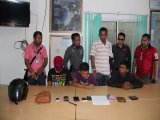
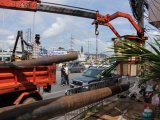
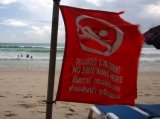
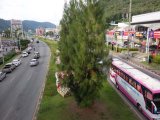


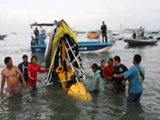
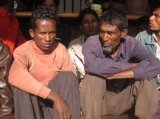
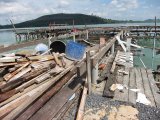
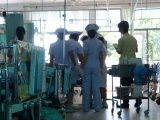



Yesterday I watched Obama's speech live on Burmese TV. I wasn't in a 5-star tourist hotel, or in an expat enclave.
Instead, I watched his speech in a small cafe in the docks area, where foreigners are rarely seen.
Although I was probably the only person ih the room who understood English, every Burmese man and woman in that cafe listened in silence and respectfully to Obama's speech.
I wish Myanmar all the best in their efforts at national reconciliation. I think solving the Kachin issues will be like a walk in the park when compared to solving the Rohingya crisis.
Posted by Simon Luttrell on November 20, 2012 12:05